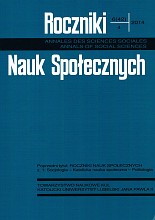Teoria konfesjonalizacji Heinza Schillinga i Wolfganga Reinharda w kontekście potencjału modernizacyjnego Polski
A Theory of the Confessionalization of Heinz Schilling and Wolfgang Reinhard in the Contexts of the Modernity Potential of Poland
Author(s): Irena WindygaSubject(s): Social Sciences
Published by: Towarzystwo Naukowe KUL & Katolicki Uniwersytet Lubelski Jana Pawła II
Keywords: confessionalization; early-modern Europe; modernization; reformation; counterreformation; marxism
Summary/Abstract: The aim of this article is to discuss the theory of confessionalization created by two German historians of religion – H. Schilling and W. Reinhard. This theory was in opposition to the Marxist vision of the overlapping confessional processes of change in early- -modern Europe, and also represented the late 70’s and 80’s of 20-th century the competitive paradigm to M. Weber’s recognition of the sociology of religion. In his reflections on the theory of the confessionalization put emphasis on the idea of modernization W. Reinhard potential of the catholic confessionalization, arguing that by my opinion that this fundamental social process present in Polish history, has an influence in the modern ages on Poles’ attitude Poles towards work who’s belonging to the Roman Catholic Church in the vast the majority. Therefore, as an important element in the modernization of the country, I consider the formation of a specific work ethic represented by the overwhelming number of its citizens who are also members of a particular religious community. In this paper, I have done an overview of the foreign literature (mainly German) – in Poland practically inaccessible, and unknown.
Journal: Roczniki Nauk Społecznych
- Issue Year: 42/2014
- Issue No: 4
- Page Range: 159-178
- Page Count: 20

